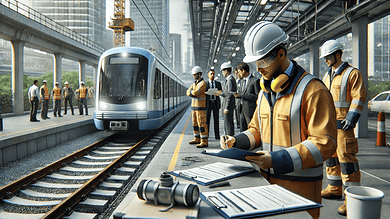Understanding the Role of a Light Rail Expert Witness in 2025

What is a Light Rail Expert Witness?
Light rail systems have become increasingly popular in urban transportation due to their efficiency, environmental benefits, and ability to reduce traffic congestion.
As cities expand their light rail networks, the need for specialized expertise in this field has grown. This is where a light rail expert witness becomes indispensable.
A rail expert witness provides specialized knowledge and insights into various aspects of light rail systems, particularly in legal contexts. Their expertise is crucial in understanding the complexities of rail operations, safety, and regulatory compliance.
This article delves into the role and responsibilities of a light rail expert witness, their importance in legal cases, and their value to the public transportation sector.
Key Responsibilities and Expertise Areas
A light rail expert witness performs various critical functions, each essential in ensuring light rail systems’ safety, efficiency, and regulatory compliance. Here’s a detailed explanation of their responsibilities:
Accident Investigation
One of the primary roles of a light rail expert witness is to act as a light rail accident investigator. Determining the cause of accidents is crucial for preventing future incidents and resolving legal disputes.
The expert witness reconstructs the accident by analyzing evidence such as CCTV footage, physical damages, and witness statements. Their findings help us understand whether the accident resulted from human error, mechanical failure, or other factors.
For example, in investigating a derailment, the expert might examine the track conditions, vehicle maintenance records, and operator actions leading up to the incident.
Accident investigation requires a meticulous approach, combining technical knowledge with investigative skills. The expert must be able to interpret complex data, identify subtle clues, and piece together the sequence of events.
This analysis often involves collaborating with other professionals, such as engineers, safety inspectors, and legal advisors, to understand the incident comprehensively.

Safety Consulting
Safety is paramount in public transportation. A light rail safety consultant assesses current safety protocols and identifies potential risks within the system.
They recommend improving safety measures and ensuring compliance with local and federal regulations. This role is vital in mitigating risks and ensuring passenger and operator safety.
For instance, a safety consultant might conduct a risk assessment for a new light rail line, evaluating factors such as track layout, vehicle design, signaling systems, and emergency response plans.
Based on their findings, they might recommend changes to improve safety, such as upgrading signaling technology, enhancing operator training programs, or implementing new maintenance procedures.
System Analysis
Efficiency in light rail operations is key to maintaining reliable service. A light rail system analyst evaluates the operational aspects of the rail system, from scheduling and maintenance to overall performance.
They identify inefficiencies and suggest improvements to optimize the system’s functionality, improving service reliability and customer satisfaction.
System analysis thoroughly reviews various components, including timetables, vehicle utilization, track maintenance schedules, and passenger flow patterns. By analyzing this data, the system analyst can pinpoint areas where improvements are needed.
For example, they might identify bottlenecks in the schedule that cause delays or recommend changes to maintenance routines to reduce downtime.
Regulatory Compliance
Ensuring compliance with regulations is critical to operating a light rail system. A rail transport litigation expert is well-versed in the legal requirements governing public transportation. They assist in ensuring that all operations meet these standards, avoiding legal issues and enhancing safety.
Regulatory compliance involves staying up-to-date with the latest rules and guidelines from various authorities, such as the Federal Transit Administration (FTA) and local transportation agencies.
The expert witness reviews the rail system’s policies and practices, identifies areas of non-compliance, and recommends corrective actions. This might include updating safety protocols, revising training programs, or implementing new technologies to meet regulatory standards.

Importance in Legal Cases
The involvement of a light rail expert witness in legal proceedings cannot be overstated. Their expertise is invaluable in various legal contexts, particularly in accidents, safety compliance, and operational disputes. Here’s how they contribute as a rail transport litigation expert:
Providing Credible Testimony
The expert witness provides testimony in court based on their thorough analysis and professional expertise. Their ability to understand complex technical details is crucial for the court’s understanding.
As public transportation expert witnesses, they ensure that all aspects of light rail operations are thoroughly examined and presented in legal terms.
Credible testimony requires technical knowledge and the ability to communicate effectively. The expert witness must be able to present their findings clearly and concisely, using language that is accessible to judges, jurors, and attorneys.
They must also be prepared to answer questions and defend their analysis under cross-examination.
Case Studies
These case studies draw on elements that are seen in real cases, but they remain entirely speculative and are used for educational and illustrative purposes.
Lega case cases highlight the critical role of light rail expert witnesses. For instance, in a recent case involving a light rail accident, the expert witness’s analysis of the accident reconstruction and safety protocols was pivotal in determining liability. Their testimony helped the court understand the nuances of the accident, leading to a fair and informed verdict.
In another case, a light rail system was under scrutiny for not meeting regulatory safety standards. The expert witness conducted a comprehensive review of the system’s safety measures and identified significant lapses. Their findings influenced the legal outcome and prompted the rail company to implement necessary safety upgrades.
Impact on Public Safety and Efficiency
Beyond their role in legal cases, light rail expert witnesses contribute significantly to improving public transportation systems, identifying risks, and recommending improvements to help enhance the safety and efficiency of light rail operations. This benefits not only the operators and regulatory bodies but also the passengers who rely on these systems for their daily commute.
For example, an expert witness might identify a recurring safety issue, such as inadequate maintenance of braking systems, and recommend a comprehensive overhaul of the maintenance protocols. Implementing these recommendations can prevent accidents, reduce downtime, and improve the service’s reliability.

Expanded Case Studies
To further illustrate the importance of a light rail expert witness, let’s delve into more detailed hypothetical case studies:
Case Study 1: The Metro City Light Rail Accident
In Metro City, a significant light rail accident occurred when two trains collided due to a signaling failure. The accident resulted in several injuries and substantial damage to the rail infrastructure. A light rail accident investigator was brought in to analyze the incident.
The expert’s investigation revealed that a faulty signal had given the wrong indication, leading to the collision. The investigator also discovered that regular maintenance checks had been neglected, contributing to the failure.
Their comprehensive report clearly explained the accident’s causes, which was crucial for the legal proceedings. The court relied heavily on the expert’s testimony to determine liability and award damages to the injured parties.
The expert’s recommendations also significantly improved the rail system’s maintenance and signaling protocols, preventing future accidents and enhancing overall safety.
Case Study 2: Compliance Audit for Urban Rail Systems
In another instance, a city’s light rail system was found to be non-compliant with several federal safety regulations. A rail transport litigation expert was engaged to conduct a thorough compliance audit. The expert reviewed the system’s safety protocols, employee training programs, and maintenance records.
The audit uncovered multiple areas of non-compliance, including outdated safety procedures and insufficient staff training. The expert provided a detailed report outlining these issues and recommended corrective actions.
Their findings were presented in court, supporting a case against the rail operator for failing to meet safety standards.
The expert’s involvement resulted in the rail operator implementing the recommended changes, including updating safety protocols, enhancing training programs, and investing in new safety equipment.
These changes resolved the legal issues and significantly improved the light rail system’s safety and reliability.
Case Study 3: Operational Efficiency Analysis
A major urban light rail system was experiencing frequent delays and service interruptions, leading to passenger dissatisfaction. A light rail system analyst was hired to evaluate the system’s operational efficiency. The expert comprehensively analyzed the scheduling, maintenance routines, and passenger flow patterns.
The analysis revealed that inefficient scheduling and inadequate maintenance were the primary causes of the delays. The expert recommended several changes, including optimizing the timetable to reduce bottlenecks, improving maintenance practices to prevent breakdowns, and enhancing communication between departments to streamline operations.
Implementing these recommendations resulted in a noticeable improvement in service reliability and passenger satisfaction. The light rail system reduced delays, increased service frequency, and provided a more reliable and efficient transportation option for its users.

Engaging a Light Rail Expert Witness
In summary, the role of a light rail expert witness is multifaceted and crucial for the safe and efficient operation of light rail systems. Their responsibilities include accident investigation, safety consulting, system analysis, and ensuring regulatory compliance.
These experts play a vital role in legal proceedings by providing credible testimony and comprehensive analyses, which help resolve disputes and ensure justice.
Their work has an impact beyond the courtroom. By identifying risks and suggesting improvements, they contribute to public transportation systems’ overall safety and efficiency.
Engaging a light rail expert witness is beneficial for legal cases and the continual improvement of light rail services, ultimately enhancing public safety and trust in urban transport.

With over forty years in public transit, Timothy Borchers is a preeminent international transit and light rail expert witness specializing in accident investigation, system safety, and industry compliance. He regularly authors authoritative articles on advanced light rail topics.

